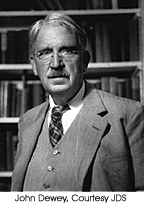 |
→ May 2004 Contents → Column
|
TV News in a Postmodern World
Argument Versus Objectivity April 2004
|
 |
|
TV News — and other forms of journalism of the future — will steadily drift away from the "professional" standard of objectivity and back to one that regularly incorporates argument into its soul. If you study Postmodernism, this conclusion is inevitable, and it will produce — I predict — a change in the culture as significant and lasting as the American Revolution. Moreover, this change will occur outside the institution of journalism and in spite of its ongoing self-examination.
To even begin understanding the dynamics of this change, one must first leave the safe pedestal of professionalism. This is why the institution will never "get it" and why the ultimate arrival of the new age will seem sudden, when it really has been bubbling and simmering for decades. So set aside everything you've been taught and believe, and let's take a little trip back in time. If journalism is the first rough draft of history, then who were the first journalists? Since the dawn of humanity, cultures have carried their myths and histories with them. These accounts reflected not only factual occurrences but also the cultural contexts within which they took place. As such, none would pass the muster of today's standards, because journalism goes beyond storytelling and includes, I believe, an element of investigation — an attempt to satisfy curiosity brought about by questions. This is the integral assumption upon which journalism is built and the missing element in much of today's junk. Let's open the New Testament for a moment. The gospel accounts of the story of Jesus carry similar story lines, but Luke (who also wrote the book of Acts) adds elements that the others don't. Take a look at the way he begins his account:
Most honorable Theophilus: Many people have written accounts about the events that took place among us. They used as their source material the reports circulating among us from the early disciples and other eyewitnesses of what God has done in fulfillment of his promises. Having carefully investigated all of these accounts from the beginning, I have decided to write a careful summary for you, to reassure you of the truth of all you were taught. (New Living Translation) Napoleon conquered Europe, yet he wrote, "Four hostile newspapers are more to be feared than a thousand bayonets." Revolutionary War era newspapers, many of which were shut down by the British for espousing their views, influenced the writing of the First Amendment, so that such opposition would never again be silenced in the new world. Facts don't need protection, but ideas certainly do. The assassination of President Abraham Lincoln provides a useful look into the mind of mid-19th Century journalism. A New York Harold dispatch from Washington during the execution of the four who conspired with John Wilkes Booth contained the following:
The execution of his murderers to-day has proven us to be a law-abiding people; otherwise the miscreants who plotted and executed their great crime would have long since been torn to pieces by the people, who were as much convinced of their guilt before as after their trial. Everything has been done decently and in order, and the majesty of the law and of the nation has been vindicated, and the guiltiest of the wretches have gone to answer for their crimes at the great tribunal where no subterfuge will avail to hide their criminality. Not much objectivity there. And of the four people hung, one was a woman, whose death the reporter justified by painting a portrait of a woman devoid of femininity.
(Her) gray eyes were cold and lifeless and added to the masculinity of her appearance. They were seldom lit up by excitement or pleasure, though occasionally they gleamed with a furious or stealthy glare which indexed the bad passions of her soul...She appears to have been masculine not only in person and manners, but in mind. The point is that the roots of journalism don't include the pristine notion that one should (or even could) stand afar off and report facts without opinion or "argument" — to use historian Christopher Lasch's term. "The job of the press is to encourage debate," he wrote, "not to supply the public with information." He espoused the idea that argument precedes understanding and is central to democratic opinion formation. And democratic opinion was the issue that split liberal thinkers in the years following World War I, when the modern public relations era was born. One group, led by Pragmatic philosopher John Dewey, believed that the public could and should participate in democracy. Walter Lippmann, the man who would later be called the "Dean of American Journalism," headed the other group and maintained that the public was too ignorant to do any more than cast ballots once in a while.
"A false ideal of democracy can only lead to disillusionment and to meddlesome tyranny. If democracy cannot direct affairs, then a philosophy which expects it to direct them will encourage the people to attempt the impossible; they will fail...The public must be put in its place, so that it may exercise its own powers, but no less and perhaps even more, so that each of us may live free of the trampling and the roar of a bewildered herd." Walter Lippmann, The Phantom Public He deplored what he saw as the uneducated manipulating the masses through the use of symbols and stereotypes and called for an educated elite to run things on behalf of everybody. Thus was born the "professional" journalist, one who was free of symbol and stereotype and would assist the other elite institutions in leading the country, something Lippmann had already done as an advisor to President Woodrow Wilson.
"...the act of voting is in a democratic regime a culmination of a continued process of open and public communication in which prejudices have the opportunity to erase each other; that continued interchange of facts and ideas exposes what is unsound and discloses what may make for human well-being...Any fair-minded survey of suppressive acts in this country will demonstrate that their ultimate source is always a privileged minority (with the majority standing passively by and permitting it to occur)." John Dewey, John Dewey Responds (1950) The Postmodernist mind is eerily similar to Dewey's and immediately repelled by Lippmann's. Pomos look around and see ruin where the elites promised prosperity. The American dream lives on only for the privileged, and the resulting anti-institutional energy is fierce and unrelenting. Technology has leveled the knowledge playing field and has thrust the masses into unfamiliar territory, where the application of knowledge used to be reserved only for the few. The rational command and control of Modernism is under assault by people who find greater comfort in anarchy than what they view as the false promise of the shepherds. Postmodernism is the Age of Participation, and media executives who don't realize that will soon find themselves unemployed. Walt Disney built his animation empire on the concept of "the plausible impossible." The term could easily be applied to the artificial journalistic hegemony known as objectivity — the silly notion that information without argument is what people want and need to live their lives. We stand on that self-hallowed ground, while the people rank us below used-car salesmen and trust of the news media is at an all-time low. Lasch noted the impossibility in an article he wrote in 1990.
"Our search for reliable information is itself guided by the questions that arise during arguments about a given course of action. It is only by subjecting our preferences and projects to the test of debate that we come to understand what we know and what we still need to learn. Until we have to defend our opinions in public, they remain opinions in Lippmann's pejorative sense — half-formed convictions based on random impressions and unexamined assumptions. It is the act of articulating and defending our views that lifts them out of the category of 'opinions,' gives them shape and definition, and makes it possible for others to recognize them as a description of their own experience as well. In short, we come to know our own minds only by explaining ourselves to others." This is why blogs are sweeping the Internet and have been embraced by a public hungry for argument. Bloggers are the journalists of tomorrow. They demonstrate a fundamental curiosity and the Internet affords them the ability to check facts. They offer arguments and links to reference material in support of their individual points-of-view, and as a whole, they make up a community of people who keep each other honest. In an article for Australia's Evatt Foundation, Tim Dunlop calls bloggers "the new public intellectuals" and gives an excellent example of bloggers setting the record straight.
"The Guardian published a report that said Paul Wolfowitz, the U.S. deputy secretary of defence, had claimed that the war in Iraq really was all about oil. Bloggers by the bucketload logged onto the United States Department of Defence website, checked the transcript of the interview Wolfowitz gave, and reported in pretty quick time that The Guardian had got it wrong. They had used a German translation of the interview that they'd then back-translated causing all the nuance to be lost in the process. Within half a day, many blogs had nailed the error and twenty-four hours later The Guardian had withdrawn the piece and apologised. Israeli Blogger Allison Kaplan Sommers recently gave an example of how the new media works: 1. Jeff Jarvis sees an item in the Daily Telegraph on the new BBC Middle East ombudsman and posts it on his blog, BuzzMachine. The big problem in all of this for "professional" journalists is its randomness. It just doesn't fit into the command and control Lippmann/Modernist mindset. But that's exactly what gives it power in a Postmodern world, where chaos is the rule and disdain for anything elite provides fuel for the journalist fire. Lincoln's "government of the people" was lifted from a statement made by Englishman John Wycliffe a few centuries earlier. Wycliffe is called by many the true father of the Protestant Reformation, because it was his English translation of the Bible that removed Christianity from the sole purview (and authority) of the Roman Church. When he finished it shortly before his death, Wycliffe said, "This book shall make possible government of the people, by the people and for the people." His argument was that only individuals who are self-governed internally are capable of governing themselves as a people. This idea lives on in Postmodernism and beautifully represents the concept of order in chaos. No groups of elites calling the shots. No manufactured consent (to borrow Lippmann's phrase). Just people living together and governing themselves. Idealistic? Perhaps. But the many voices of tomorrow's media (it's closer than you think) demand to be heard, and all great cultural changes of the past have been birthed in such cries. And if life teaches anything, it's to never underestimate the power of free communication. © Terry L. Heaton
|
|
|
Write a Letter to the Editor
Join our Mailing List
© The Digital Journalist
|
 The idea that the public might intrude into the affairs of "responsible men" was repugnant to the cynical Lippmann, who voiced his social engineering vision in two important books, Public Opinion (1922) and The Phantom Public (1925).
The idea that the public might intrude into the affairs of "responsible men" was repugnant to the cynical Lippmann, who voiced his social engineering vision in two important books, Public Opinion (1922) and The Phantom Public (1925). Dewey, on the other hand, was a firm believer that the open exchange of ideas permitted the people to govern themselves:
Dewey, on the other hand, was a firm believer that the open exchange of ideas permitted the people to govern themselves: